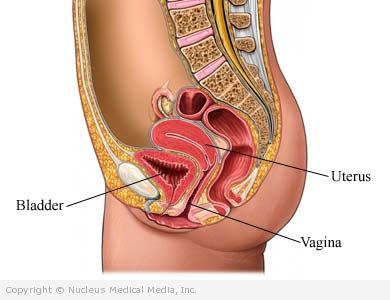(Painful Sexual Intercourse)
Dyspareunia – Definition
Dyspareunia refers to pain in the pelvic area. It occurs during or after sexual intercourse. This can occur in both men and women. It is more common in women.
Dyspareunia – Causes
Women
The cause is believed to be physical factors at least 75%-80% of the time.
Some pain occurs first at vaginal entry but decreases over time. This is often caused by not having enough lubrication due to a lack of sexual arousal and stimulation. It can also be due to some medicines. Antihistamines can cause dryness. Frequent douching can cause problems, as well.
Other causes in women include:
- Postpartum period after childbirth
- Vaginal infections (eg, yeast vaginitis)
- Postmenopausal atrophic vaginitis — irritation of the vaginal mucosa due to lack of estrogen
- Endometriosis
- Herpes or genital warts
- Pelvic inflammatory disease — serious infection of the female reproductive organs
- Urinary tract infection
- Problems affecting the pelvic bones
- Retroversion (abnormal orientation) of the uterus
- Chronic constipation
Psychological factors are not often involved, but may be associated with:
- Previous sexual trauma (rape or abuse)
- Feelings of guilt
- Negative attitudes toward sex
These factors may lead to a condition called vaginismus. This is painful and involuntary contractions of vaginal muscles. It is usually a response to past sexual trauma or other painful circumstances.
Men
The most common causes of pain in men are:
- Prostatitis — inflammation of the prostate
- Urethritis — inflammation of the urethra
Pain occurs at the time of ejaculation.
Pain that occurs while obtaining an erection may be associated with:
- Inflammation of the foreskin
- Loss of elasticity of the foreskin
- Trauma to the penis
- Herpes or genital warts
- Local allergies or irritations
- Curvature of the penis caused by Peyronie’s disease
Dyspareunia – Risk Factors
Factors that increase your chance of dyspareunia include:
In women:
- Being postmenopausal
- Taking medicines that produce a vaginal dryness
In men and women, viral or bacterial infections may be to blame.
Dyspareunia – Symptoms
Pain associated with dyspareunia may:
- Occur during or after sex
- Be itching, burning, stabbing, or aching
- Be located in the:
- Vagina
- Urethra
- Bladder
- Pelvis
- Penis
- Testicles
- Occur during all phases of sexual contact or only with deep thrusting
- May also occur with tampon use (fabric absorbs natural vaginal lubricant)
Dyspareunia – Diagnosis
The diagnosis is often made based on your symptoms. Your doctor will take a medical and sexual history. A physical exam will be done.
For women:
- Your doctor will check your vaginal wall to look for:
- Signs of dryness
- Inflammation
- Infection
- Genital warts
- Scarring
- Your doctor will also do an internal pelvic exam to look for:
- Abnormal pelvic masses
- Tenderness
- Signs of endometriosis
For men and women:
- Your doctor may suggest more tests. They may include cultures to find infections. Imaging studies like ultrasound may also be used.
- You may be referred to a counselor. This will help to determine whether psychological issues may be a cause.
Dyspareunia – Treatment
Women
- Your doctor may recommend that you use water-soluble lubricants or creams that have estrogen. Other medicines may be prescribed, as well.
- Infections may be treated with antibiotics or antifungal medicine.
- Viral infections like herpes and genital warts will also need to be treated.
- Endometriosis may be treated with medicines. In some cases, surgery may be done.
Men
To treat prostatitis and urethritis, the doctor may recommend:
- Antibiotic treatment
- Sitz baths (soaking the hip and buttocks area in warm water)
- Avoiding alcohol and caffeine (may be helpful for prostatitis)
Sometimes surgery may be done to treat foreskin and other erectile problems.
Men and Women
When no physical cause of the pain can be found, sex therapy may be helpful. Some concerns need to be worked through in counseling. These may include:
- Guilt
- Inner conflict
- Unresolved feelings about past abuse
- Need for self-punishment
Dyspareunia – Prevention
- After childbirth, gentleness and patience should be used. Wait at least six weeks before having sexual relations.
- Use proper hygeine and get routine medical care.
- Practice safe sex to prevent sexually transmitted diseases.
- Adequate foreplay and stimulation will help to ensure proper lubrication of the vagina.
- Use a water-soluble lubricant. Vaseline should not be used as a lubricant. It is not water-soluble, and it may encourage vaginal infections.

